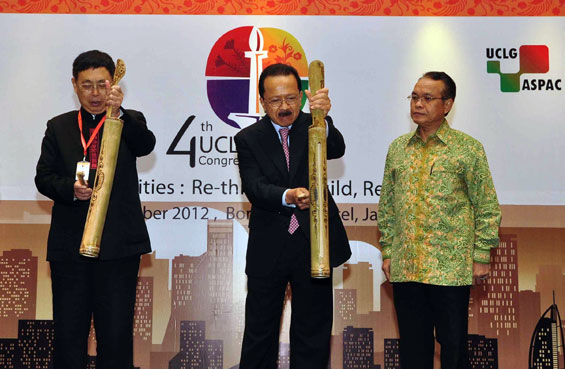
Photo: New-FB-crop
Economic growth depends on cities becoming more resilient
03 October 2012
by Richard Forster
UCLG ASPAC, the largest association of city leaders and local governments in the Asia-Pacific region, opened its fourth annual congress yesterday in Jakarta, Indonesia. The theme of this year’s event is Resilient Cities, looking not only at how cities can face up to natural disasters but also discussing what measures they need to take to adapt to the changes afforded by globalisation, urbanisation and climate change.
Welcoming 500 delegates to his home city, Fauzi Bowo, the President of UCLG ASPAC and Governor of Jakarta, noted that despite the growth opportunities afforded by urbanisation, two-thirds of the world’s poor still live in the region. “One factor which has been a pressure point in the region is the base of urbanisation, which is unparalleled by any other area in the world, with 11 of the world’s megacities located in this region,” said Bowo.
In the last two decades, the urban proportion of the population in Asia-Pacific has risen by 29 percent and the region is now home to 45 percent of the world’s youth, around 700 million young people.
Bowo said that this young population could be an engine of growth if managed properly but with the challenge of combating climate change and the need to reduce poverty, cities in the Asia-Pacific region must instil measures to ensure they are more resilient if the opportunities from urbanisation are to be maximised.
“Certainly, urban planning and building design play an important role in facilitating the development of a greater capacity for future resilience but there is more than this,” said Bowo. “There are two other crucial pillars to building strong cities: one is developing adequate infrastructure to be able to cope with the speed of growth and equally important, is preparing people in cities to be able to be resilient and to be able to embrace the changes needed to complement urban planning.”
Resilience and adaptability depend on the people who make and shape the cities. “Strong cities can only be established and sustained if there is good governance in the way they are managed with a good flow of communication between the mayor and the people,” said Bowo.
In a video message for delegates, Margareta Wahlström, Special Representative for the UN Secretary-General on Disaster Risk Reduction, said: “This congress sends a strong message that local governments and municipalities are on the front line when it comes to reducing risk and adapting to climate change. You know better than anyone the importance of good governance, of urban planning and citizen participation, when it comes to reducing the number of deaths and economic losses resulting from disasters.”
A special session on day two will focus on a review of the tools made available to local governments by the United Nations International Strategy for Disaster Risk Reduction. Other sessions will look at how to attract strategic investments in urban infrastructure; the pathway to achieve a low-carbon city; and capacity building to make communities more resilient.







